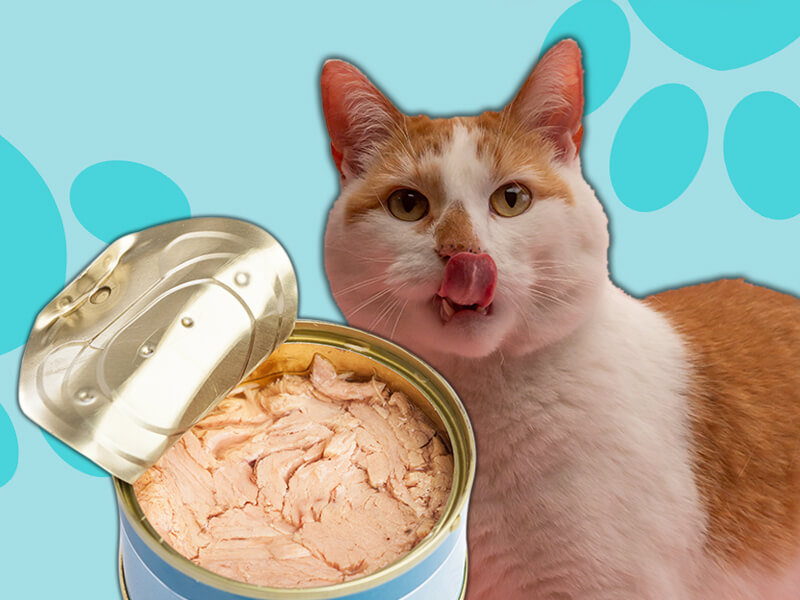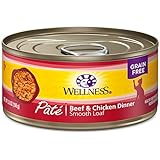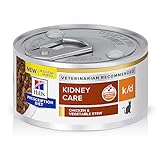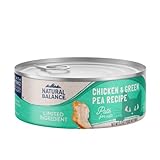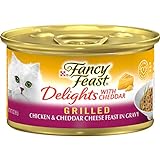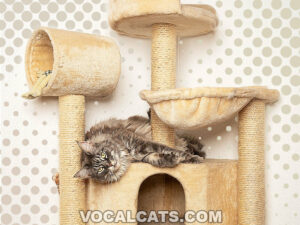Can Cats Eat Canned Chicken? Yes, cats can eat Canned Chicken, but only in moderation. Canned Chicken is a great source of meat for an obligate carnivore like cats. Canned Chicken is also packed with multivitamins that are essential for maintaining the normal functions of body organs. It also provides Omega-3 fatty acids for our cats’ immune system and healthy skin.
Canned Chicken in water is a staple in my pantry. I use it to make delicious recipes like chicken wraps and soup. Each time I cook with it, my cat keeps on begging me for some. If your cat is doing the same, you may be wondering, “Can I feed my cat Canned Chicken?”
As a cat lover, I always wonder if human food like chicken nuggets is safe for feline consumption. But, let’s save that for another day because today, I’d like to talk in-depth about the benefits and the precautions of feeding our cats Canned Chicken.
Contents
- Can Cats Have Canned Chicken?
- What is Canned Chicken?
- Canned Chicken vs Canned Tuna
- Is Canned Chicken Good For Cats?
- Is Canned Chicken Bad For Cats?
- Is Canned Chicken Okay For Cats?
- Is Canned Chicken Safe For Cats?
- Is It Safe To Feed Cats From The Can?
- What Canned Foods Are Safe For cats?
- Can Kittens Eat Canned Chicken?
- So, Can I Give My Cat Canned Chicken?
- Canned Chicken For Cats
- Can Cats Eat Canned Chicken Breast?
- Can Cats Eat Canned White Chicken?
- Can Cats Eat Canned Chicken In Water?
- Can Cats Have Canned Chicken In Water?
- Can Cats Eat Canned White Chicken Without Cooking?
- Can You Feed Cats Canned Chicken Without Rinsing?
- Can You Give Cats Canned Chicken Straight From The Can?
- Can Cats Eat Canned Chicken Thighs?
- What Canned Human Food Can Cats Eat?
- Alternatives To Canned Chicken For Cats
- Best Canned Chicken For Cats
- My Cat Ate Canned Chicken! What To Do If My Cat Ate Canned Chicken?
- So, Can Cats Eat Canned Chicken?
- Related Questions
Can Cats Have Canned Chicken?
If you run out of cat food, you may ask, “Can a cat eat Canned Chicken?” Yes, but I recommend that you order cat food as soon as you can. The sodium content of Canned Chicken is too high for him to eat it frequently.
Based on the nutritional profile of ½ cup of Canned Chicken, you can see that it’s not a super healthy food for your cat if given all the time.
½ cup or 100 grams of Canned Chicken has a sodium content of 482 milligrams which is too high for our cats.
Then, look at the total fat content. Our cats only require 5.5 grams/day but ½ cup of Canned Chicken gives 8.1 grams. We all know that a diet high in sodium and fat content leads to tons of health problems.
Nutritional Profile of ½ cup Canned Chicken (100 grams)
| Name, Unit | Amount |
| Calories, cal | 185 |
| Sodium, mg | 482 |
| Carbohydrate, g | 0.9 |
| Total Fat, g | 8.1 |
| Saturated Fat, g | 2.25 |
| Protein, g | 25.3 |
| Cholesterol, mg | 50 |
| Calcium, mg | 14 |
| Magnesium, mg | 19 |
| Phosphorus, mg | 153 |
| Potassium, mg | 153 |
| Iron, mg | 1.3 |
| Vitamin B-6, mg | 0.19 |
READ NEXT: Can Cats Eat Boiled Chicken?
What is Canned Chicken?
Canned Chicken is pre-cooked chicken, typically chicken breast. It is preserved and hermetically sealed in a tin-coated steel can to prevent air from seeping in and bacteria from growing that can cause spoilage.
It contains modified food starches to stabilize the meat against temperature changes. Sodium phosphates are added to maintain the texture of the chicken and extend its shelf life.
The Canned Chicken referred to in this article is a product used for human consumption that is soaked in water with salt. It does not refer to the Canned Chicken cat food that is solely made for cats.
Since cats are obligate carnivores that get most of their nutrients from a meat-based diet, and Canned Chicken consists mostly of protein, can my cat eat Canned Chicken?
This is the question that we will try to answer to give you information on whether it is a good option for your cat’s diet.
In the meantime, I’d like to recommend a cat food that is made with wholesome ingredients to meet all the nutritional requirements of your cat. This is the Wellness Complete Health Grain-Free Wet Canned Food.
This Canned Chicken cat food has all the right ingredients to protect vital organs including the kidneys.
What’s more to love? It does not have soy that may damage their liver. Rather it has Omega-3 fatty acids which protect the kidneys, reduce inflammation, and make their skin and coat healthy.
Canned Chicken vs Canned Tuna
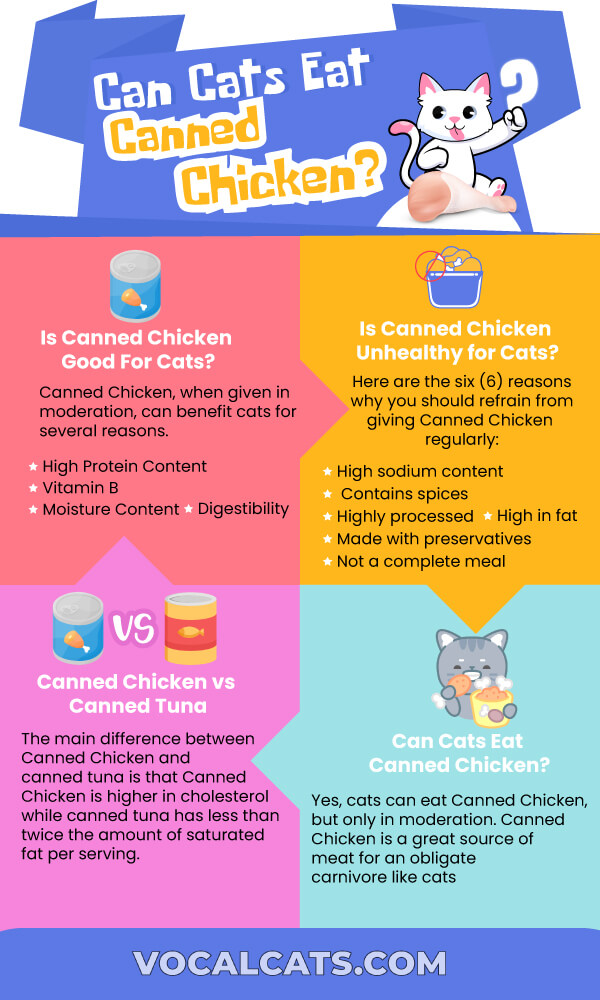
When it comes to giving alternative treats to our cats, is Canned Chicken better than canned tuna? Since both contain protein, the canned tuna vs Canned Chicken debate always comes up.
The protein content of Canned Chicken is slightly higher compared to canned tuna. Chicken contains around 25 grams of protein per 100 g, while tuna has 24 grams. Both are also good sources of B vitamins and minerals such as iron, magnesium, potassium, and zinc.
The main difference between Canned Chicken and canned tuna is that Canned Chicken is higher in cholesterol while canned tuna has less than twice the amount of saturated fat per serving.
Because of this, Canned Chicken has a higher caloric content than canned tuna. This could pose a problem when trying to maintain an ideal weight for your cat, especially for a mostly indoor cat that doesn’t get enough exercise.
However, canned tuna has more mercury content which could lead to mercury poisoning over time if consumed regularly. Tuna contains more mercury compared to other fishes like salmon since they prey on smaller fishes that already have trace amounts of mercury in their system.
Is Canned Chicken Good For Cats?
Canned Chicken, when given in moderation, can benefit cats for several reasons. Aside from its protein content, it can supplement your cat’s need for certain vitamins and minerals like B vitamins and other nutrients like iron, magnesium, and zinc.
1. High Protein Content
As obligate carnivores, cats benefit from Canned Chicken as a good source of protein. They require protein to survive, and their liver constantly converts protein into energy.
Cats also require a diet rich in protein to maintain a strong immune system, grow and repair muscular tissues, and control blood sugar levels.
2. Vitamin B
Canned Chicken contains many B vitamins such as thiamin, riboflavin, niacin, pyridoxine, and pantothenic acid.
These B vitamins help to metabolize proteins, fats, and carbohydrates, as well as, support neurological development.
3. Moisture Content
Canned Chicken has enough moisture to keep your cat hydrated which aids in proper kidney functioning.
Cats rarely drink large amounts of water. Instead, they typically acquire the water they need from the foods they eat. This is why canned/wet cat food is very beneficial for our cats.
One of the trusted brands in the market is the KD Kidney Care Chicken And Vegetable Stew Canned Cat Food.
4. Digestibility
Canned Chicken consists of only a single protein. It is typically chicken breast which is easily digested by cats compared to rendered meat products like meat meal which contains meat, chicken bones, and cartilage.
Canned Chicken can be a good alternative for cats having stomach problems or digestive issues.
Is Canned Chicken Bad For Cats?
Since cats are obligate carnivores, is Canned Chicken unhealthy for cats? If given as an occasional treat, Canned Chicken will not cause health problems for our fur babies.
But if you’d give it as part of her diet, then, I’m sorry to inform you that it may result in health issues that may affect her vital organs like the heart and kidneys.
Here are the six (6) reasons why you should refrain from giving Canned Chicken regularly:
1. High sodium content
To make Canned Chicken delectable, salt is added to it. While cats need sodium in their daily diet, adding extra salt from Canned Chicken will do more harm than good.
Salt toxicity is a serious problem that can result in various symptoms such as these:
- Vomiting and diarrhea
- Body incoordination
- Tremors
- Seizures
- Coma
2. Highly processed
Canned Chicken is a processed food that is cooked and sterilized in high heat to prevent bacterial contamination. This process alters the flavor (that’s why lots of salt is added), texture, and even the nutritional content of fresh chicken.
3. Contains spices
Why do you like the taste of Canned Chicken? It’s because of the seasonings like salt and broth. Our cats do not need any of these spices.
Rice starch, which is one of the ingredients in making Canned Chicken, may cause allergic reactions in some cats.
4. Made with preservatives
To increase the shelf life of Canned Chicken to 3 to 5 years, preservatives are added. These are sodium phosphate and sodium nitrite.
High intake of sodium nitrite may lead to methemoglobinemia, a condition that affects the red blood cells. The symptoms may include:
- Increased heart rate
- Rapid breathing
5. High in fat
As you’ve seen in the nutritional table above, ½ cup of Canned Chicken exceeds the daily requirements of cats for their daily intake of total fat. Add to that the high levels of salt. This means that Canned Chicken is high in fat and may lead to weight gain.
6. Not a complete meal
As a responsible cat Mom, I want nothing but a complete and healthy diet for my fur baby. Unfortunately, Canned Chicken is not one of those. For one, it does not have taurine, an amino acid essential for their vision and immune system.
Is Canned Chicken Okay For Cats?
It is OK for cats to eat Canned Chicken, but give it once in a while only. Yes, Canned Chicken is loaded with protein but our cats are better off eating meat without any flavorings and additives.
Too much Canned Chicken is bad for our fur babies. Do not take salt toxicity for granted. Excessive salt will lead to dehydration and if not treated right away, it can lead to death.
Is Canned Chicken Safe For Cats?
For as long as you stick to the right proportion, yes, Canned Chicken is safe for our cats. Otherwise, Canned Chicken can cause obesity and can also lead to other problems such as diabetes and cardiovascular disease.
Is It Safe To Feed Cats From The Can?
No, it’s because the edges of the can are too sharp which may lead to injuring their tongues and faces. So, it’s best to invest in a good-quality feeding bowl for your fur baby.
Scoop out ½ cup or even less of Canned Chicken and place it in your cat’s feeding bowl.
What Canned Foods Are Safe For cats?
Any types of food that are washed, milled, heated, and canned are referred to as processed food. So, be it Spam, Vienna sausage, or Canned Chicken, all of these are made with salt and preservatives.
Eating canned foods with moderation like Spam is safe but keep in mind that spoiling them with too many canned foods is a bad idea.
READ ALSO: Can Cats Eat Chicken Skin?
Can Kittens Eat Canned Chicken?
No, avoid feeding your kitten with anything that has plenty of salt and preservatives like Canned Chicken.
If kittens eat food containing salt, their bodies will try to get rid of that excess salt by urinating a lot. This in turn leads to the loss of other nutrients like calcium and potassium which kittens need to develop normally.
So, Can I Give My Cat Canned Chicken?
Yes, but always remember to give it once in a while only.
Canned Chicken For Cats
The major component of our cats’ diet should be meat, chicken being one of those. Our cats have different nutritional requirements from us, so what is good for us may not be for them. We, humans, can eat Canned Chicken regularly but our cats should only have it very seldom.
DON’T MISS: Can Cats Eat Chicken Noodle Soup?
Can Cats Eat Canned Chicken Breast?
Yes, cats can eat Canned Chicken Breast as an alternative treat but not as part of their main diet. Most Canned Chicken contains cooked chicken breast parts in the first place with some rib meat.
However, due to it being highly processed with lots of sodium, Canned Chicken should be sparingly given to your cats to prevent health issues.
Can Cats Eat Canned White Chicken?
Yes, cats can eat Canned White Chicken which is mostly chicken breast. Chicken breast is a good source of lean meat with lower fat content compared to beef.
Even so, Canned White Chicken should only be given to cats occasionally due to its high sodium content.
Can Cats Eat Canned Chicken In Water?
It is recommended that Canned Chicken be rinsed first with water or drained completely to lessen the amount of sodium. Giving your cat Canned Chicken together with the water in the can will increase their sodium intake.
Cats already get their daily recommended sodium intake from their regular cat food and adding more sodium to their diet can cause a host of health problems.
Can Cats Have Canned Chicken In Water?
Yes, cats can eat Canned Chicken in water, but only in moderation. While the added moisture can hydrate your cat, too much sodium has the opposite effect of dehydrating your cat by forcing the body to pull water from its tissues.
Can Cats Eat Canned White Chicken Without Cooking?
Yes, Canned White Chicken is already fully cooked and ready to eat, so there is no need to cook it further.
It is fine to microwave it for a minute since some cats enjoy their food lightly warm which mimics the body temperature of their fresh prey in the wild.
Can You Feed Cats Canned Chicken Without Rinsing?
I would recommend rinsing the Canned Chicken first before serving it to your cat to get rid of the excess salt in the meat. The average sodium content of Canned Chicken contains ten times as much sodium as your cat needs daily, so even a small portion can increase their salt intake.
Can You Give Cats Canned Chicken Straight From The Can?
Canned Chicken meat is ready for consumption but you shouldn’t feed your cat straight from the can. This is because the edges of the can may cut the mouth areas of your fur baby leading to injuries.
Can Cats Eat Canned Chicken Thighs?
Canned Chicken thighs may contain some soft bones that your cat may choke on or cause obstruction in their digestive tract.
I would suggest caution by examining the meat itself first before feeding it to your cat. Chicken thighs also contain more fat and calories so be judicious when giving it as a treat.
What Canned Human Food Can Cats Eat?
Cats have a different metabolism compared to humans, so cats should only be given meals that are tailored to their nutritional needs which a regular cat food can provide. However, canned human food can be a good option only as treats or if you run out of regular cat food at the moment.
A lot of fruits and vegetables can be canned nowadays, including many meats. So, what canned food can cats eat?
For canned vegetables, asparagus, peas, green beans, and carrots are fine to be consumed by cats in small quantities. Tomatoes and mushrooms are not recommended since these can cause diarrhea or vomiting.
As for canned fruits, most contain sugary syrups that can wreak havoc on their health if given in large quantities. Canned mangoes or pears can be given in moderation, but oranges and grapes are a big no-no since these are toxic to cats.
Canned meats, on the other hand, can be a good source of protein, but opt for those that contain less sodium with no added spices.
So, can cats eat human Canned Chicken? Yes, when it comes to canned meat, chicken, turkey, or tuna are the best choices for your cat since they contain less fat and sodium compared to canned pork or beef.
However, regardless of the type of food, all canned items require salt or sugar to preserve the content. These are designed to be safe for humans to consume, but not for our four-legged friends’ health.
Alternatives To Canned Chicken For Cats
The well-being of my fur baby is always my priority, hence, I avoid feeding her human food. Rather, I prefer high-quality cat food that does not contain any fillers, wheat, or animal by-products because these ingredients might cause an allergic reaction.
If you’re on the lookout for the best alternatives to Canned Chicken for cats, I recommend these two (2) products:
The Natural Balance Chicken And Green Pea Canned Cat Food is made with limited ingredients to prevent allergic reactions. But that doesn’t mean that the food is bland. On the contrary, my Lilac Ragdoll loved it! Plus, this cat food has the right balance of nutrients including taurine.
If you still haven’t found the perfect food for your cat, the Fancy Feast Delights-Chicken And Cheese Canned Cat Food is another one of my cat’s favorite.
Best Canned Chicken For Cats
What cats can and cannot eat when they’re sick? My cat becomes choosy when she is not feeling well.
To encourage eating, I sometimes add a small dollop of Canned Chicken and use it as a food topper. But, to be safe, I read the labels and choose the one with lesser salt content which I feel is the best Canned Chicken for cats.
I have another cat food recommendation which is very tasty because it’s made of various types of meat such as beef, chicken, liver, and some fruits. It is the Wellness Complete Health Grain-Free Wet Canned Food. It’s patė, so it has a soft texture that your cat is sure to enjoy eating.
My Cat Ate Canned Chicken! What To Do If My Cat Ate Canned Chicken?
If your cat has only eaten a tiny portion of Canned Chicken, then there is nothing to panic about. However, these are some signs that might require a visit to your vet:
- Vomiting
- Diarrhea
- Bloating
- Excessive thirst
- Dehydration
- Incoordination
Excessive salt in the body or sodium toxicity is a condition that must be resolved immediately to prevent further dehydration. Intravenous fluids may be administered to restore the balance of electrolytes in their system as well.
So, Can Cats Eat Canned Chicken?
Yes, cats can safely eat Canned Chicken in water as long as it is not part of their daily meal. Canned Chicken should only be given occasionally as treats or when you are currently out of conventional cat food.
Canned Chicken is not a comprehensive meal that will meet your cat’s daily nutrient requirements. Furthermore, its high sodium concentration is detrimental to your cat’s overall health.
Related Questions
Chicken meat that has been properly cooked and does not contain much oil or seasoning doesn’t usually upset a cat’s stomach. Cats with chicken allergies, however, may display symptoms of chronic itchiness and skin inflammation.
Yes, cats can eat Canned Chicken Breast. Most Canned Chicken products contain chicken breast meat with some rib meat. Rinsing it in water or draining the can before serving them the meat is advisable to prevent adding excess sodium to their diet.
Canned Chicken is good as an occasional treat for dogs and cats. It should not be regularly given to our furry friends because of their excessive sodium content which can cause a variety of health problems later on.
DISCLAIMER: THIS WEBSITE DOES NOT PROVIDE MEDICAL ADVICE
The information, including but not limited to, text, graphics, images and other material contained on this website are for informational purposes only. No material on this site is intended to be a substitute for professional veterinary advice, diagnosis, or treatment. Always seek the advice of your veterinarian or other qualified health care provider with any questions you may have regarding dietary needs.

With over five years of specialized experience as an animal writer, my expertise lies in cat nutrition, health, behavior, grooming, and training. I am dedicated to delivering helpful and informative content that caters to the well-being of our feline friends. My primary goal is to empower pet owners with knowledge and ensure our feline companions thrive in health and happiness. In my free time, I love volunteering at local cat rescue centers.
